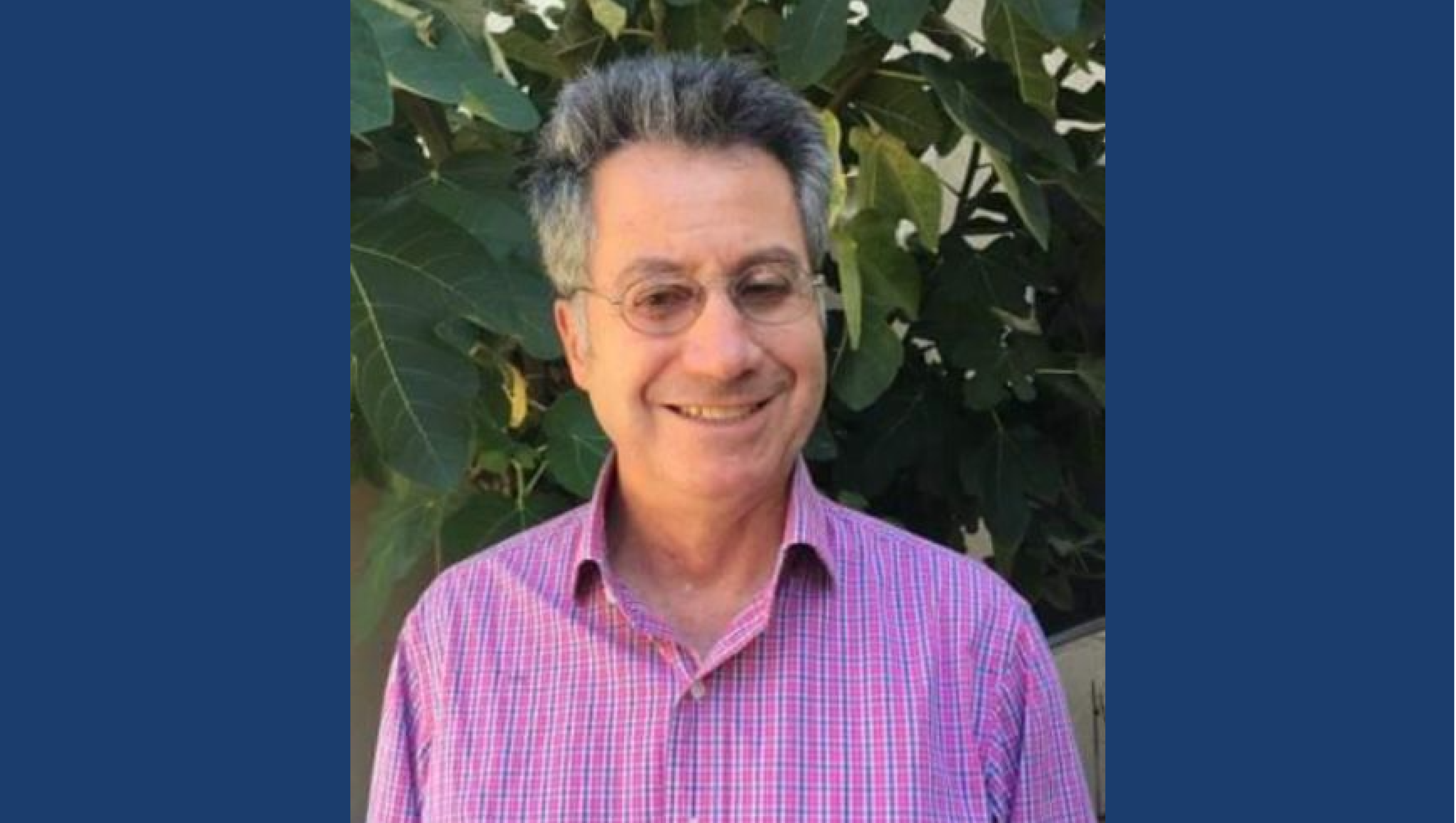
By Raúl Romo
As a young boy growing up in Capilla de Guadalupe, Mexico, José Mario Martín-Flores began to lose his sight. Back then, he never imagined that one day he would stand in front of a college classroom in the United States, guiding students through the intricate world of literature. Yet the gradual loss of vision caused by glaucoma sharpened his inner sense, and led him to a life of poetry, teaching and advocacy.
When reflecting on his decision to study literature, Martín-Flores, who completed his Ph.D. in Spanish at UC Irvine, fondly recalls his mother’s reaction. Aware of his visual condition, she was surprised by his choice: "It's a bit unusual for someone who can't see to choose a career that involves so much reading," he recalls with a smile. Martín-Flores had his first encounter with literature and poetry while attending the Autonomous University of Guadalajara. Sparked by workshops led by Mexican poet Elías Nandino at the public library, and surrounded by intellectuals and writers, he cultivated a deep interest in poetry. This passion still motivates his work today.
Sowing seeds of knowledge and unity
By the time Martín-Flores pursued his doctoral studies at UCI, his career as a literature professor and poet was already gaining momentum. While his career began as an adjunct professor at multiple universities in Mexico, his academic achievements and dedication opened doors beyond his homeland, allowing him to cross borders and engage with the American academic world. After a brief stay on the East coast as Visiting Faculty at the State University of New York at Potsdam, and eager to learn from professors he had long admired, Martín-Flores arrived in Southern California to pursue his Ph.D. At UC Irvine, he found not only a platform to further his professional ambitions but also an invaluable network of support.
Martín-Flores describes his time in graduate school as an "enriching, committed and expansive experience" and calls his experience in the Spanish and Portuguese Department "an impressive intellectual expansion." He is especially grateful for the sense of community fostered by both the department and his peers, as well as for the opportunities that helped him grow professionally. In addition to his academic course load and teaching responsibilities, Martín-Flores served as the Disabled Student Representative at UCI and worked closely with the Disability Services Center to advocate for greater awareness and support for students with visual challenges. Through this role, he gained access to resources that enhanced his performance as doctoral student and positively influenced his professional development. In recognition of his efforts, the center provided Braille writing equipment and arranged for audio recordings of course materials, many of which were generously recorded by his classmates. Reflecting on the initiative and support from the DSC, he recalls that the “assistance was timely, efficient and incredibly kind,” which enabled him to graduate with distinction and deeply influenced his teaching philosophy.
For Martín-Flores, who regularly returns to campus for the Annual Conference on Mexican Studies, coming back to Irvine feels "like coming home," revitalizing the network of relationships with young researchers in the field and colleagues who share his discipline.
Bridging the two Californias
Now a professor at San Diego State University, Martín-Flores recognized early on in his faculty career the urgency to study transnational relationships through literature and poetry. In diasporic literature, the professor finds a silent yet profound documentation of Mexican emigration, captured by poets and narrators who explore the nuances between identity and belonging. The distinctiveness of this diverse and growing body of work, he notes, "is porous and fluid, like the identity of the diaspora itself."
Building on this scholarly focus, and with the support of students and colleagues, Professor Martín-Flores expanded his reach into the broader community through public-facing events on related topics. These initiatives enabled his students to connect with emergent and recognized scholars from both sides of the border. Through literary workshops, regional symposia and community events led by academics from Mexico and the United States, Martín-Flores and his colleagues continue to promote reading, creative writing and the study of regional literature. He has also worked to document this literary phenomenon through digital and anthologized storytelling archives exploring themes such as migration and the experience of living between two worlds.

One of Martín-Flores' most significant contributions to the exploration of this collective set of experiences is his collaborations with Mexican photographer Manlio César Correa and professor of Chicano Studies José Rodolfo-Jacobo. Using a magnifying glass to access Correa’s and Jacobo’s photographic archive, Martín-Flores translated the visual material into over thirty poetic texts, which accompanied a collection of ninety photographs. This collaboration, resulting in the publication of The Giving Gaze (2004), demonstrates Martín-Flores’ efforts to make the experiences of the border community perceptible as he explores the intersection of visual imagery, language and shared narratives. His poetry reflects the nuanced dynamics of life on the border, where hardship and hope coexist. In the poem “Las paredes oyen/The Walls Have Ears” he writes:
Hoy es menos muro,
vértebra quizá de un cuerpo
renacido.
Si la travesía fue descorazonadora,
hoy Borderlandia: pacto con un corazón nuevo,
es brillo y reflejo lo que antes sombra.
La vida se volvió más valle que miel,
menos laberinto y la esperanza
se hizo empleos y universidades
y habita entre nosotros
junto a la cizaña
como en todas partes.
(Martín-Flores, lines 19-30)
Today it’s less of a wall,
a vertebra perhaps
of a new body.
If the travesty was discouraging then,
today it’s Borderlandia: a pact with new heart;
what was shadow before is now bright and shiny.
Life became more the valley than its honey,
less of a labyrinth,
and hope became jobs and universities,
and lives amongst us,
along with trouble
as everywhere.
Translation by Gustavo Segade
Beyond capturing the subtleties of migration through his poetry, Martín-Flores often reflects on how society grapples with uncomfortable topics like blindness, cancer and death, noting that people are generally unprepared to confront these realities. As a professor of Latin American literature and a poet, he acknowledges the discomfort of living with blindness, yet he uses poetic language to bring visibility to the blind community. His poetry collection Claves de Niebla, which explores themes of blindness, earned first place in the prestigious Tiflos International Competition. The anthology was recognized by an esteemed panel of judges, including members of the Royal Spanish Academy and a recipient of the Prince of Asturias Award. This accolade reflects the powerful resonance of his work and its contribution to contemporary poetry.
In his poem "From Canaan to Egypt," Martín-Flores uses the senses to express through words the sense of belonging within diasporic communities, while also mapping, in a narrative fashion, the space he works in the border between Tijuana and San Diego:
Pegado el oído al territorio
encuentras tu norte,
la ruta de las ciudades santas misionales,
levantadas con las manos
como pan nuevo entre el horno del desierto,
y el azul más Pacífico del mundo.
(Martín-Flores, lines 10-15. P 94)
With your ear to the territory
you locate your North,
the way to the missionary cities of the saints,
lifted by hand
like fresh loaves in the oven of the desert,
and the most Pacific blue in the world.
Translated by Sergio Waisman & Raúl Romo
Today, Martín-Flores continues to inspire both in the classroom and through his writing. By the end of this year, he plans to complete a novel about the Bracero movement, drawing from his family’s experience and presenting it as a novelized archive that reflects this diasporic exchange.
With a smile, Martín-Flores shares, "It is said that literature is not a path but a destination. It is not a fleeting experience, but an arrival." Martín-Flores' perseverance demonstrates his belief that literature is not merely a field of study but a profound means of understanding and transforming oneself and the world.
Raúl Romo (he/él/ele) is a Ph.D. student in the Department of Spanish and Portuguese at UC Irvine. He holds a B.A. in Design from UC Davis and an M.A. in Spanish from CSU Bakersfield. His research explores contemporary queer representation in Latin American literature, film, and art, with a focus on Mexico and the U.S. At UCI he has co-organized the XXVIII Mexican Studies Conference and co-curated the 2024 UCI Latin American Film Festival.
Interested in reading more from the School of Humanities? Sign up for our monthly newsletter.
